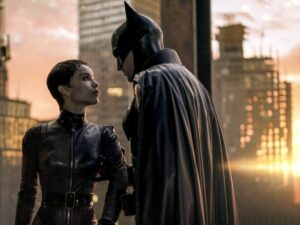In an era of comic book movie exploitation, rare is the occasion where a film, based on comics, inextricably mirrors deeper realities such as childhood trauma, big government corruption, and violent escapism. Matt Reeves seems to echo the gritty realism of Christopher Nolan’s The Dark Knight (2008) with his iteration of the caped crusader in 2022’s The Batman. Where Nolan, and more prominently, the late actor Heath Ledger, convinced us that a menacing psychopath could carry out a somewhat noble, albeit sadistic, plot to expose corruption even in modern America, Reeves achieved the same effect. At times, the connection between the two films, and especially the plots, did seem almost too similar. It’s a forgivable mistake, but there were points that it seemed like a lazy attempt to recreate the approach of the most popular and critically acclaimed Batman film to date.
However, Reeves brought a wonderful focus onto Bruce Wayne’s past and present struggles, particularly based on the loss of his parents. Other Batman films have explored this, but what Robert Pattinson’s version captures beautifully is the residual effect of this trauma. He shows the vulnerability to this character who in some ways is still a boy that never recovered from this incident. The casting of Pattinson might be perceived by some as a stretch considering his boyish looks and fame due to the Twilight series. In actuality, it makes him the perfect choice to capture that vulnerability (besides, his jawline in the Batsuit more than makes up for any misconceived lack of masculinity).
From the voice (which didn’t require extra modification) to the mannerisms, Pattinson expands the layers of the caped crusader beyond the typical mysterious hero persona he’s often portrayed as. We’ve seen Bruce Wayne’s backstory revealed in past iterations, but what separates Pattinson’s version is how noticeable the effect that backstory has on the character’s entire life. Fleshed out through connecting storylines involving the crime boss Carmine Falcone, the Riddler, and the mayor’s son, this Batman’s complicated personality is adequately explained. Pattinson’s performance is almost intoxicating, as he seems sunken deeply into a role he was meant to play. Worth noting is the complement of Andy Serkis’ Alfred, who introduces the complexity of Alfred being a father figure to Bruce Wayne.
While the pace and length of the film could be deemed off-putting, the characterization, even beyond Pattinson’s Bruce Wayne, more than made up for it. Building a world of this cultural magnitude, especially within relatively close proximity to a recent version, simply requires the kind of acute detailing that Reeves makes use of. Far removed from the shtick of Jim Carrey as the Riddler in Batman Forever (1995), we’re introduced to the typical outcast that 2022 America creates in Paul Dano’s Riddler. Sure, some of the mechanisms of his sinister plot were perhaps forcibly reminiscent of Ledger’s Joker, such as the barrage of warnings on video.
However, Reeves and Dano make it work by utilizing the traditional nature of the Riddler, and his clever riddles, coupled with some modern inflections, including cyphers and cryptograms. A picture is painted of the kind of fringe internet groups that exist today in America, perhaps not dissimilar to those involved in storming the capital or causing riots in response to perceived wrongdoings by our government.
Other noteworthy characters include Zoe Kravitz’ Catwoman, who establishes a similar trajectory of motivation based on her backstory much like Pattinson’s Bruce Wayne. The teasing romance idea of Batman and Catwoman is appropriately played by the two actors. Jim Gordon, portrayed by Jeffrey Wright, is wonderfully conflicted in trying to maintain his righteous stand while his entire world unfolds around him.
Wright depicts Gordon with a brutal determination to be a man who may bend, not break. Finally, Colin Farrell is virtually unrecognizable as Oswald “Penguin” Cobblepot, which in and of self is an impressive feat. But more importantly he helps establish the appeal of Italian mob undertones, alongside John Turtorro as Carmine Falcone. Although a bit on the nose, Reeves utilizes these characters to effectively create a world within a world, and naturally build upon the list of Batman’s enemies, essential to the framework of the story.
In the end, Reeves completes the next phase in the evolution of the Batman comics presented on film, picking up where Nolan left off. Expanding on Christian Bale’s iteration, Pattinson’s Batman is so obviously viewed more as a freak than a badass (he is even shown getting hit by opponents much more often than any other rendition). While it doesn’t compromise his bravery, heroism, or masculinity, it makes him more accessible and relatable. The audience can start to see why a kid who lost his parents and never knew why is lashing out and managing that pain in any way he knows how.
Just when we thought there was no more layers left to explore in this material, Reeves delivers a fresh spin on the world of Gotham. It is an effective, fitting, and timely film, whose grittiness and realism are captured perfectly by Nirvana’s Something in The Way, a song from the score.
Rating: 9.5/10

